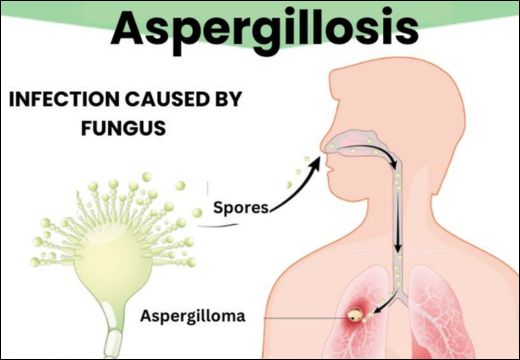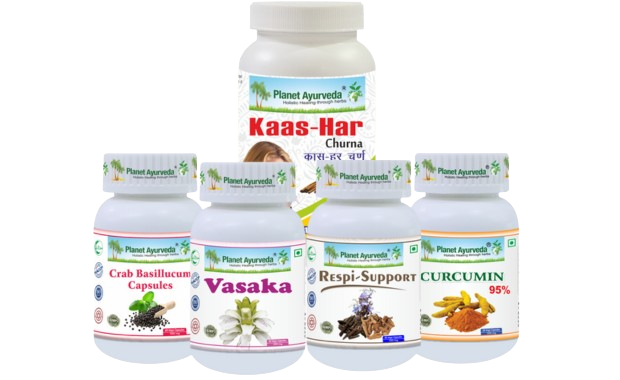Aspergillosis – Causes, Symptoms, Treatment & Herbal Remedies
Abstract
The lungs are our constant gateways to the outside world and also the first to greet countless airborne microbes, including fungi, spores, bacteria etc. When these tiny spores bypass weakened defenses, they can settle deep within the air passages and trigger persistent fungal infections. This delicate interaction reflects not just microbial exposure but the strength of one’s inner resilience and One such infection is Aspergillosis. It is a fungal infection caused by Aspergillus spores that commonly affect the lungs, especially when immunity is low. It appears in several forms, including allergic aspergillosis, chronic pulmonary aspergillosis, and invasive aspergillosis, each differing in severity and depth of tissue involvement. These types range from mild allergic reactions to serious ones requiring medical attention. In this write up we will discuss Aspergillosis in detail and what ayurveda has to serve for this. Let’s start!

Introduction
Aspergillosis is a slow-moving, persistent fungal invasion caused by Aspergillus species, often thriving in weakened or sensitive lungs. Like a quiet intruder, it settles deep within the airways, forming stubborn colonies that trigger breathlessness, cough, and fatigue. Over time, this chronic and invasive infection can seep into surrounding tissues, creating pockets of inflammation and structural changes. Its presence is subtle yet relentless, often masked by everyday respiratory discomforts. Aspergillosis reminds us how something microscopic can wield significant influence over well-being, demanding early attention, strong immunity, and a carefully tailored medical approach to prevent deeper complications and reclaim respiratory balance. In Ayurveda, it reflects a deep vitiation of Vata and Kapha, where stagnation, dryness, and weakened Ojas (Vital nectar of life) create a fertile ground for imbalance.
Causes
Inhalation of Aspergillus spores is the only cause because the fungus enters the body through breathing. The pores can be inhaled from air, dust, soil, compost, decaying leaves, damp buildings, stored grains, air-conditioning ducts, and construction sites and essentially any environment where the fungus grows. The predisposing factors can be Pre-existing lung diseases Such as Asthma, COPD, TB cavities, Bronchiectasis, Uncontrolled diabetes and Poor overall resistance.
Types And Symptoms
- Allergic Bronchopulmonary Aspergillosis – It is an allergic lung condition caused by an exaggerated immune response to Aspergillus spores, most commonly Aspergillus fumigatus. It primarily affects individuals with asthma or cystic fibrosis, triggering airway inflammation rather than direct tissue invasion. Symptoms include wheezing, persistent cough, shortness of breath, and occasional sputum containing brownish mucus plugs.
- Chronic Pulmonary Aspergillosis – It is a slowly progressive fungal infection of the lungs caused by Aspergillus species, often developing in individuals with pre-existing lung conditions such as tuberculosis, COPD and sarcoidosis. Unlike allergic forms, it involves actual fungal colonization and gradual tissue destruction, forming cavities or “fungal balls” (aspergillomas). The symptoms include chronic cough, weight loss, fatigue, breathlessness, and occasional hemoptysis (Blood during coughing).
- Invasive Aspergillosis – It is a serious and rapidly progressing fungal infection caused by Aspergillus species, primarily affecting people with severely weakened immunity, such as those undergoing chemotherapy, organ transplants, or prolonged steroid therapy. Unlike chronic or allergic forms this involves direct tissue invasion, often starting in the lungs and potentially spreading to other organs like the brain, kidneys, or heart. Symptoms include fever, cough, chest pain, shortness of breath, and sometimes hemoptysis.
- Aspergilloma (Fungal Ball) – It is a localized mass of Aspergillus fungus that grows within pre-existing lung cavities, often formed after tuberculosis, sarcoidosis, or other chronic lung diseases. Unlike invasive forms, aspergillomas usually do not invade surrounding tissue but can cause persistent cough, fatigue, and sometimes hemoptysis (coughing up blood). Many cases remain asymptomatic and are discovered incidentally on imaging.
- Cutaneous Aspergillosis – It is a rare fungal infection affecting the skin, usually occurring when Aspergillus species enter through wounds, burns, surgical sites, and intravenous catheters. It primarily affects immunocompromised individuals, including those on chemotherapy, long-term steroids, or with uncontrolled diabetes. Symptoms include red or purple lesions, nodules, ulcers, or necrotic patches that may spread if untreated.
- Sinus Aspergillosis – It is a fungal infection of the nasal and paranasal sinuses caused by Aspergillus species. It can occur as a non-invasive form, often presenting as chronic sinus congestion, nasal discharge, sneezing, and facial pressure, or as an invasive form, which is more aggressive and may cause tissue destruction, facial swelling, pain, and fever, particularly in immunocompromised individuals.
Diagnosis
- Physical examination
- Lung Biopsy showing fungal hyphae
- Aspergillus-specific IgE/IgG, Galactomannan, Beta-D-glucan, Sputum or tissue culture
- Chest X-ray, CT and MRI for lungs and Sinuses to detect cavities, nodules, or fungal masses
Modern Treatment
- Corticosteroids (Oral prednisolone) are the mainstay to reduce allergic inflammation
- Antifungal therapy such as Itraconazole or Voriconazole helps reduce fungal load and steroid requirement
- Biologics (e.g., Omalizumab or Dupilumab) are used in severe, steroid-dependent cases
Ayurvedic Overview
Aspergillosis, though not named in Ayurveda, mirrors the pathology of Prāṇavaha Srotas Duṣṭi described in ancient ayurvedic texts. When fungal spores are inhaled, they behave like the “dhūli–rājāṃsi” (dust, impurities, suspended irritants) obstructing Kapha pathways, disturbing Vāta flow, and creating respiratory distress.
कफोपक्लिष्टगमनः पवनो विसमागतिः।
प्राणोदकान्नवाहिनि दुष्टः स्रोतांसि दूषयन्॥ २॥
उरःस्थः कुरुते श्वासमामाशयसङ्कुलम्॥
Ashtang hridya Nidan Sthana 4/3
This śloka perfectly reflects the internal disturbance caused by inhaled Aspergillus spores. The spores irritate and inflame the respiratory passages, acting like classical dhūli (fine dust). Kapha increases, forming thick mucus that obstructs natural airflow. The obstruction forces Vāta into irregular motion (vishama gati), manifesting as breathlessness, chest tightness, wheezing, and coughing. In chronic or invasive forms, the vitiation spreads to prāṇa, udaka, and anna-vaha srotas leading to fever, fatigue, tissue irritation, and depletion of Ojas (Vital nectar of life). The ayurvedic treatment focuses on restoring respiratory health, balancing Kapha and Pitta, boosting immunity, and clearing toxins from the body.
Ayurvedic Herbs For Managing Aspergillosis
1. Vasa (Adhatoda vasica)
Vasa contains alkaloids like vasicine, Bromhexine and vasicinone, which act as bronchodilators and expectorants. It helps loosen mucus, improve airflow, and reduce bronchial inflammation, making it a key herb for Kapha accumulation and compromised Prāṇavaha Srotas (Respiratory channel) function. It is highly effective in asthma, bronchitis, and chronic respiratory disorders.
2. Tulsi (Ocimum sanctum)
Tulsi is rich in eugenol, ursolic acid, and rosmarinic acid, providing anti-inflammatory, antimicrobial, and immunomodulatory effects. It helps protect lung tissue from microbial and oxidative damage, reduces congestion, and enhances respiratory immunity. It is highly beneficial for respiratory infections and chronic inflammation, supporting healthy lung function.
3. Yashtimadhu (Glycyrrhiza glabra)
Licorice contains glycyrrhizin, which exhibits anti-inflammatory, antimicrobial, and mucoprotective properties. It soothes irritated respiratory mucosa, reduces chronic cough, and improves mucus clearance. It is useful in asthma, bronchitis, and viral or fungal airway inflammation, supporting overall pulmonary health while balancing Kapha.
4. Pippali (Piper longum)
Pippali contains piperine, a bioactive compound that enhances respiratory metabolism, reduces mucus accumulation, and exhibits mild bronchodilatory effects. It also improves digestion (Agni) and systemic immunity. It is beneficial in chronic respiratory disorders, promoting lung clearance and strengthening Prāṇavaha Srotas (Respiratory channel).
5. Kantakari (Solanum xanthocarpum)
Kantakari is rich in steroidal alkaloids and saponins, providing anti-inflammatory, bronchodilator, and expectorant effects. It reduces mucus, clears bronchial passages, and supports immune defense in respiratory tract infections. It is highly effective in asthma, chronic cough, and bronchitis, making it a potent Kaphahara herb.
Panchkarma Procedures For Aspergillosis
1. Ushna Svedana (Warm Herbal Steam)
Ushna sweda is used to liquefy Kapha and ease thoracic congestion and formulations such as Dashmoola Kwath, Vasa (Adhatoda) decoction, Tulsi–Pippali steam infusion.
2. Mridu Virechana (Mild Purgation)
This helps systemic detoxification and reduces residual Kapha-Pitta irritation and formulations such as Trivrit Lehya, Avipattikar Churna, or low-dose Gandharvahastadi Eranda oil is used.
3. Pratimarsha Nasya (Nasal Inhalation Of Medicated Formulations)
Nasal inhalation helps to lubricate nasal passages, supports mucosal clearance and reduces irritation. It can be done with Anu Taila, Shadbindu Taila, or Vasa Ghrita.
4. Kavala & Gandusha (Oil Pulling And Gargling)
This process strengthens upper airway tissues and reduces oropharyngeal discomfort which can be done with Dashmoola oil, Triphala decoction and Irimedadi Oil.
5. Dhoomapāna (Herbal Smoke)
Herbal smoke can be done for mucosal strengthening with herbs such as Haridra, Vacha, Jatamansi and tulsi blends.
Herbal Remedies For Aspergillosis By Planet Ayurveda
Planet Ayurveda is a globally trusted Ayurvedic brand, certified with USFDA registration, GMP, ISO and HALAL standards. The company formulates its products using 100% pure herbs, free from chemicals, preservatives, and artificial additives. Every capsule, oil, and formulation is crafted under the expert supervision of MD Ayurveda doctors, following authentic classical principles from ancient texts. With a strong focus on purity, safety, and effectiveness, Planet Ayurveda’s herbal supplements are recognized worldwide for their high potency, strict quality control, and consistent therapeutic efficacy. For aspergillosis we have numerous formulations out of which we are going to discuss some of them as follows.
- Respi Support Capsules
- Kaashar Churna
- Curcumin 95% Capsules
- Crab Basillicum Capsules
- Cap Vasaka
Product Description
1. Respi Support Capsules
Respi Support Capsules are a pure herbal capsule based formulation prepared using Karchoor (Curcuma zedoaria), Bharangi (Clerodendrum serratum), Pippali (Piper longum), Chironji (Buchanania latifolia) etc. These capsules exhibit bronchodilatory, mucolytic, and antioxidant actions, offering supportive respiratory comfort. In Aspergillosis, they help to maintain airway clarity and support immune resilience. Also it clears the Kapha obstruction from the respiratory channel and balances all the trienergies.
Dosage – 2 capsules twice daily with plain easter after meals.
2. Kaas-Har Churna
Kaas-har Churna is a classical herbal powder designed to support respiratory channels, particularly in conditions like Aspergillosis. It contains Vanchlochan (Bambusa arudinacea), Pippali (Piper longum), Dalchini (Cinnamomum verum) and other Kapha-balancing herbs. These herbs are rich in active constituents such as piperine, cinnamaldehyde, lignans, which help soften mucus, support bronchial clearance, and maintain airway comfort. This powder helps in Kapha balancing and clearing of Prāṇavaha Srotas (Respiratory channel) supporting normal breathing.
Dosage – 1 tsp twice daily with plain water after meals.
3. Curcumin 95% Capsules
Curcumin 95% Capsules are pure herbal capsules prepared using standardized 95% curcumin extract from Curcuma longa (Turmeric) rhizomes. These capsules possess anti-inflammatory, antioxidant, immunomodulatory, and antimicrobial properties. In Aspergillosis, they help to maintain airway integrity, reduce inflammatory stress, inhibit microbial overgrowth and support respiratory comfort and mucosal resilience.
Dosage – 2 capsules twice daily with plain water after meals.
4. Crab Basillicum Capsules
Crab Basillicum Capsules are pure herbal capsules containing standardized extract of Ocimum basilicum (Krishna tulsi) and other herbs. This formulation is known for its Shothahara (anti-inflammatory) and Kapha-pacifying properties, supporting Prāṇavaha Srotas (Respiratory channel) and healthy respiratory function. It contains eugenol, ursolic acid, Piperine which exhibit anti-inflammatory, antioxidant, bronchodilatory, and mild antimicrobial action.
Dosage – 2 capsules twice daily with plain water after meals.
5. Cap Vasaka
Vasaka Capsules are pure herbal capsules containing standardized Adhatoda vasica (Vasaka) leaf extract. Its active alkaloids vasicine and vasicinone, exhibit bronchodilatory, mucolytic, anti-inflammatory, and mild antimicrobial effects which helps to maintain airway patency, reduce mucus accumulation, and support respiratory comfort in aspergillosis. This helps in balancing Kapha and Vata Dosha and maintaining healthy breathing flow.
Dosage – 2 capsules twice daily with plain water after meals.
To buy these Products, please visit store.planetayurveda.com
Conclusion
In a nut shell it can be concluded that Aspergillosis is a chronic respiratory condition requiring careful management. Ayurveda offers a holistic, gentle, and supportive approach by addressing root imbalances in Kapha and Vata, clearing Prāṇavaha Srotas (Respiratory channel), and strengthening the body’s natural resilience. While modern medicine provides antifungal therapy and symptomatic relief but ayurveda emphasizes restoring balance, improving vitality, and nurturing overall health. As one ancient saying inspires: “When the body is nourished, the spirit rises, even the hardest battles become lighter.”




